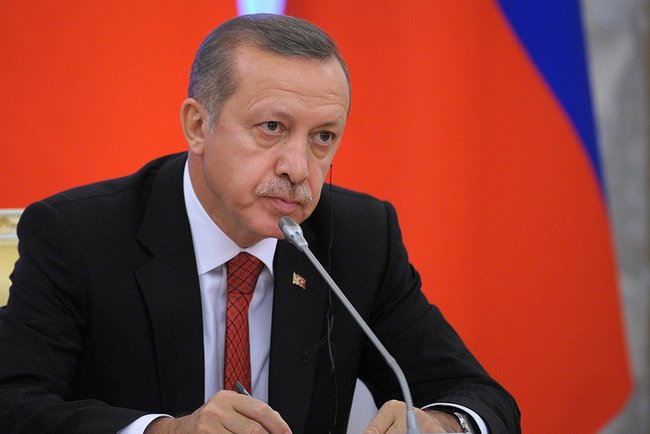Presidential Elections: Erdoğan at the Peak of His Power

The presidential and parliamentary elections on 24 June have resulted in a victory for the incumbent, Erdoğan, and the ruling party, the AKP, respectively. Erdoğan declared himself the winner while the votes were still being counted. ‘The unofficial results are in’, Erdoğan stated late on election night in Istanbul; ‘the Turkish people has given me the mandate to be the president and to lead the government’. In the early morning, after preliminary results were announced, Erdoğan told his supporters in Ankara that the elections would ‘shape our country for the next half century’.
Standing on the famous balcony of the AKP headquarters, the location Erdoğan traditionally celebrates his victories, the present and future president proclaimed: ‘Brothers, the victors in this election are democracy, the will of the people, and the people itself. The victor in this election is every single one of our 81 million citizens’. With the transition to a presidential system of government that is about to become effective, Erdoğan has arrived at the peak of his power. The new system vests his office with nearly unlimited clout. There are no checks and balances of the kind present in the US or the French presidential systems; the ‘presidential system á la Turca’ has more in common with Latin American models.
For the time being, however, the opposition refused to be impressed by the ruling party's celebrations. Bülent Tezcan, spokesman of CHP, the largest opposition party, expressed confidence that Erdoğan would ultimately fail to achieve a majority and that there was going to be a runoff election pitting Erdoğan against the CHP candidate, Ince. "They're celebrating prematurely’, he told the media, ‘there is going to be a second round’. He also called on citizens to guard the polling stations.
Muharrem Ince, the presidential candidate of CHP, too warned the public to guard against electoral manipulation: ‘Whatever they are going to do, they are going to lose. The era of winning elections through fraud and vote rigging is over. I will defend your votes with my life. We shall succeed!’ But a few hours later, Sadi Güven, the chief of the central election commission, announced that Erdoğan had won. Official results are going to be published on 5 July. Erdoğan is scheduled to be sworn in on 8 July. On the same day, the Parliament is slated to convene for its constituent session.
At 87.6 percent, turnout was two percentage points higher than at the general elections held in November 2015. With all ballots counted, Erdoğan has won 52.59 percent of the vote in the presidential election. His main opponent, Muharrem Ince of the CHP, can claim 30.64 percent. Selahattin Demirtaş, supported by the pro-Kurdish HDP and currently in prison, has won a respectable 8.40 percent. Meral Akşener, the chairman of the İyi Party, a faction founded only months ago, fell short of expectations with 7.29 percent. In her first public appearance after the poll, Akşener announced that she would continue to lead her party, although from outside of Parliament. Temel Karamollaoğlu, candidate of the Islamist Saadet party, and Doğu Perinçek of the left-nationalist Vatan party, polled a hopeless 0.89 and 0.20 percent, respectively.
Erdoğan's victory was celebrated not just in Istanbul and Ankara. In Germany too, thousands gathered in the streets in the evening of 24 June to celebrate Erdoğan's triumph. According to preliminary, unofficial results, the present and future president has won almost two-thirds of the vote among Turks in Germany. At 64.8 percent, his support in Germany exceeds his approval rate in Turkey by more than 12 percentage points. There are almost three million people of Turkish descent in Germany, although many of them have German citizenship only. About 1.44 million Turks in Germany were eligible to vote. However, only about 660,000 of them turned out to cast their vote.
Even though this is significantly more than the number of voted in the 2015 elections, it still means a voter turnout of just 45.7 percent. In terms of absolute numbers, Erdoğan won about 420,000 votes. Of the 13 polling stations in Germany, those in Essen (76 percent) and Düsseldorf (70.5 percent) returned the greatest support for Erdoğan according to Sabah, a newspaper close to the government. The German results were not instrumental to Erdoğan's victory; the number of German Turks is too low. They did, however, promptly spark a debate on integration, just as they had after the previous election. Chancellor Merkel and President Steinmeier congratulated Erdoğan on his victory. ‘I am looking forward to further and intensify, together with you, the cooperation between our two countries’, the Christian Democratic chancellor emphasized. The Social Democratic head of state congratulated his Turkish counterpart in a phone call.
He went on to express hope that Erdoğan would succeed in healing the rifts in Turkish society, according to a spokeswoman. Germany, she said, had a vested interest in the social and economic development and the promotion of the rule of law in Turkey.
Putin, the President of Russia, acknowledged Erdoğan's ‘great political authority’. The Iranian president, Rohani, expressed his hope that the ‘cordial and brotherly relations’ between the two neighbouring countries would continue to strengthen; Ankara and Tehran should continue to promote security and peace in the region. The three countries are engaged in pacifying war-torn Syria in the so-called Astana Format. The first head of government of an EU member state to congratulate Erdoğan was Viktor Orbán, the Minister President of Hungary, proclaiming that ‘stability in Turkey’ was great news ‘for all of Europe’.